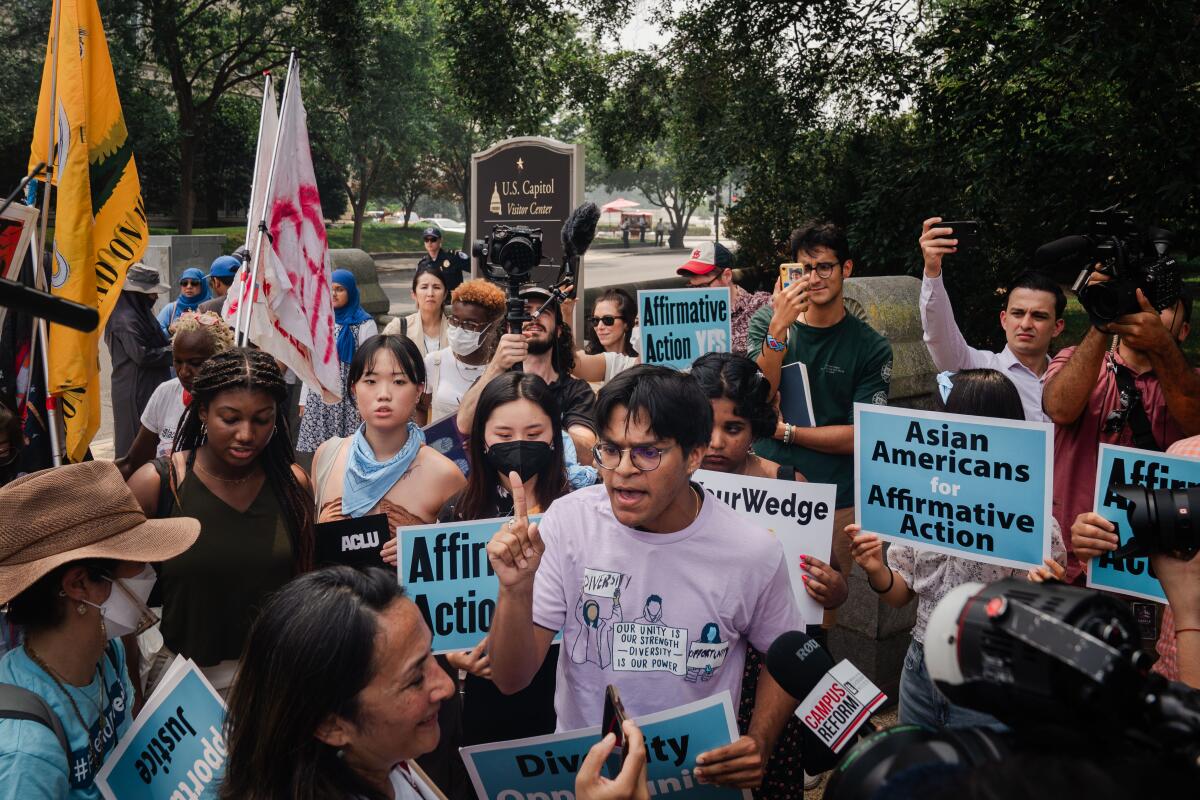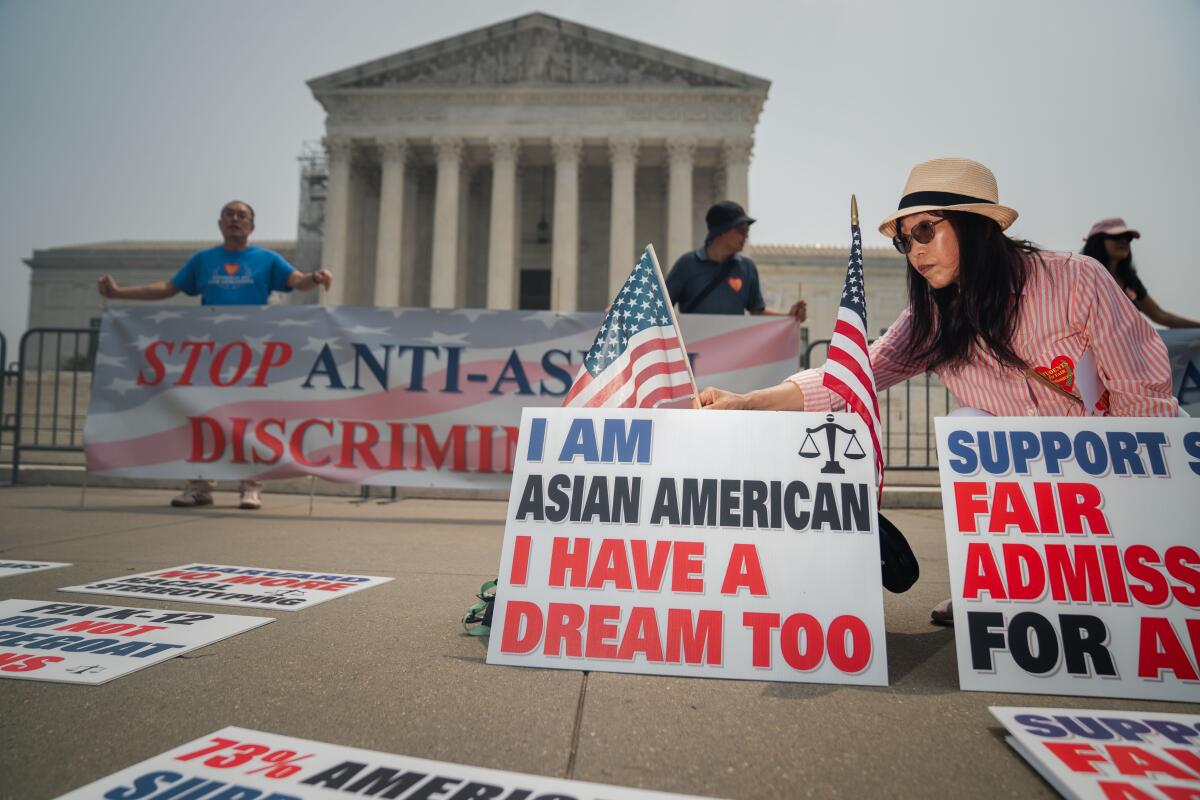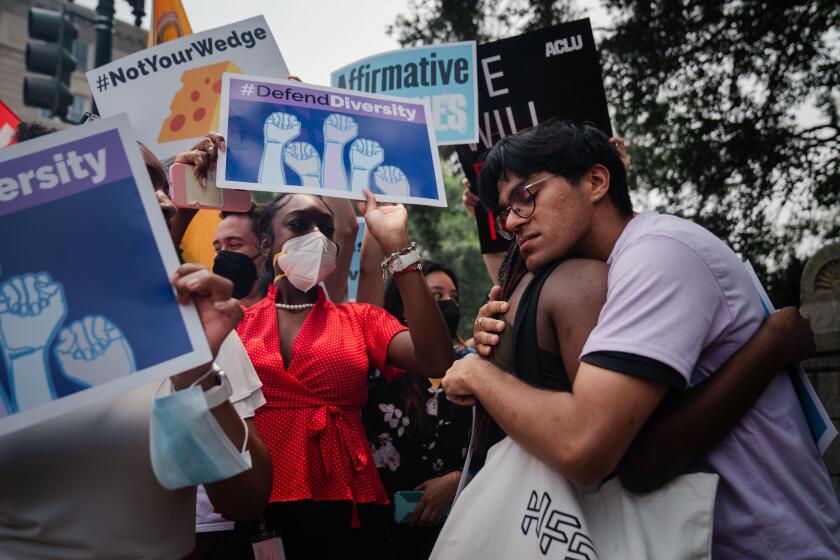A message for Asian American students in affirmative action’s aftermath

It’s a weird time to be an Asian American high schooler.
Nationwide, political forces are waging a battle for the fate of diversity on college campuses, and if we are to believe conservative activist Edward Jay Blum and the Chinese families supporting him, all of this is for your benefit.
On top of that, now that the Supreme Court has struck down affirmative action, some people are criticizing Asian Americans for becoming Blum’s pawns in the case. Blum’s political action group, Students for Fair Admissions, successfully sued Harvard for discriminating against Asian American students.
I know many young Asian Americans are afraid to be judged for our opinions about affirmative action. So I want to state for the record that in my view, Harvard’s treatment of Asian American students was racist. Admissions committees assigned “personal ratings” to each application as a vague measure of personality, and they systematically underscored Asian American applicants.
And if you apply to an elite university that a lot of Asian American students want to attend, I do think your chances are probably worse than students of other races, just because of the math. If a disproportionate number of qualified Asian American students apply, then a disproportionate number of those students will be rejected. It doesn’t help that many high-achieving Asian American students often apply from the same schools, because colleges and universities also seek to admit geographically diverse students.
In another major reversal, the Supreme Court forbids the use of race as an admissions factor at colleges and universities.
But ultimately I don’t think it is racial injustice for a qualified student to attend UC Irvine instead of Stanford University, nor do I think a Harvard where the student body is 50% high-scoring Asian Americans is more fair or just.
Pursuing prestige is different from pursuing an education or pursuing justice, and we need to try to understand that. Because race’s impact on our lives does not end after we choose which racial identification box to check on our college applications.
We find it in our dating life, our college classrooms, our workplaces and our friend groups. People will assume we are spoiled if we grew up in a wealthy suburb such as Arcadia, Pasadena or San Marino. They might shout “Chinese virus” at us or our loved ones as we walk down a street.
When we try to join spaces for people of color, they might question our status as a minority and imply that we are white adjacent, refusing our solidarity. If we were born abroad and have an accent, we face another set of negative assumptions. Same if our skin is dark or our religion is not Christian.
Soon you will see there’s a bigger, more powerful kind of “affirmative action” at work in society, a network of privileges that helps white people succeed, made up of things such as legacy admissions, generational wealth, homeownership and safe and stable neighborhoods with faster police response times. And try as you might, you’ll never benefit from that kind of affirmative action either.

So if white people won’t accept us, nor will some people of color, where do we belong?
I don’t have an answer to that question. But that is our journey and our struggle.
Belonging.
And I want you to know that you have nothing to be ashamed of. We are the only ones who know what it was like to grow up with this hair and these features and these families. Remember, no one can tell you who you are. You get to decide.
You can think whatever you want about affirmative action, and it’s OK if you’re still trying to figure it out. But when you decide whether to support any policy such as affirmative action, here’s my advice: Know that you are not just forming an opinion in a vacuum, but making a real world choice about who your community is.
Your community is the people you empathize with, whom you care about. If they mess up, or suffer, you give them the benefit of the doubt. If they err, you try to help them see why.
And it’s my community that tells me what my stance on affirmative action is. I think the policy was needed because it was one of the primary means of empowering those who want to make America a more racially just place. Because even if I wasn’t the beneficiary of these policies, I consider the people who affirmative action helped to be part of my community.
I don’t think there is any articulation or representation of Asian American identity that will ease these nagging feelings of non-belonging. Belonging comes from being a part of a community. It has to do with who you decide your community is and what relationship you want to have with it.
And it’s often in college where you figure that out.
My dream school was Brown University, but I ended up at UCLA. Through the random roommate selection process, I met Marques, who opened my eyes to the historical racism perpetuated by the journalism industry and anti-Black policing; who passed me the right books at the right times.
I met Ariz, who taught me to make adobo and made me more aware and curious about different kinds of Asian American culture. I met Jason, who forced me to wrestle with more conservative, religious perspectives and the principles of philosophical argument.
I’d bet you can meet people such as these on almost any campus you end up on. Once you can see their circumstances, they will be interested to learn yours.
Lastly, if you have thought about this issue, considered that it might hurt you, but decided to support affirmative action anyway, I think you should be proud of yourself. And your parents should be proud, too.
Affirmative action’s end is celebrated by some Asian Americans, but what have we won? And what have we lost?
It isn’t fair that students face this huge moral quandary at such a young age. But in your decision to consider the greater good you have shown more hope and generosity than most adults who have faced this same choice. And what we couldn’t figure out, I hope you will.
Last week I spoke with Gabriel Sundaramoorthy, a recent graduate of Gabrielino High School in San Gabriel. He graduated with a 4.5 GPA, competed in speech and debate and was named a national merit semifinalist. When it came time to apply for colleges, Sundaramoorthy, whose mom is Mexican American and whose father is from Sri Lanka, was counseled to check only “Hispanic” on his application in an attempt to improve his chances of admission.
But Sundaramoorthy, 18, checked both boxes, because he wanted to be honest about who he was. He’s headed to UCLA this year.
“I’m still pro affirmative action. I try to look at the larger picture,” said Sundaramoorthy, who served on an education advisory committee at Gabrielino that studied ways to close the achievement gap. “There is a need for this policy for the betterment of our society as a whole. I can’t be caught up by the potential of harm to just me.”
More to Read
Sign up for Essential California
The most important California stories and recommendations in your inbox every morning.
You may occasionally receive promotional content from the Los Angeles Times.













